John Locke's Philosophy: Relevance to Modern Political Systems
VerifiedAdded on 2023/04/08
|11
|2158
|316
Essay
AI Summary
This essay examines John Locke's profound impact on the Enlightenment and his enduring relevance to modern society. It delves into his political ideas, including natural rights, the social contract, and the role of government in protecting individual freedoms and property rights. The essay contrasts Locke's views with those of Hobbes and Filmer, highlighting Locke's emphasis on individual liberty and limited government. It further explores the development of private property ideas and Locke's influence on subsequent social contract theorists like Rousseau and Rawls. The essay concludes by asserting the importance of Locke's ideas in shaping democratic societies and promoting equality, emphasizing their continued significance in contemporary political thought. Desklib provides access to this essay and many other study resources.
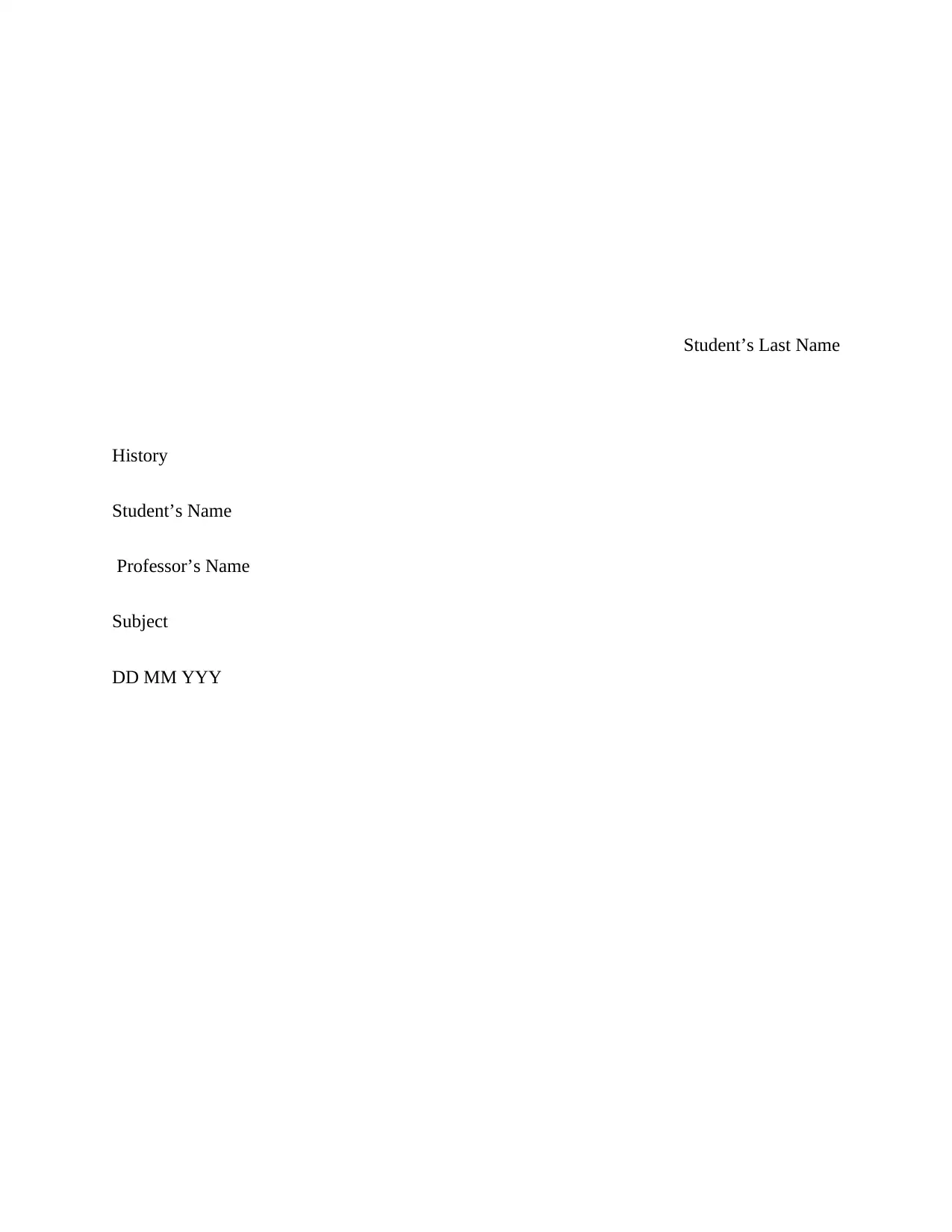
Student’s Last Name
History
Student’s Name
Professor’s Name
Subject
DD MM YYY
History
Student’s Name
Professor’s Name
Subject
DD MM YYY
Paraphrase This Document
Need a fresh take? Get an instant paraphrase of this document with our AI Paraphraser
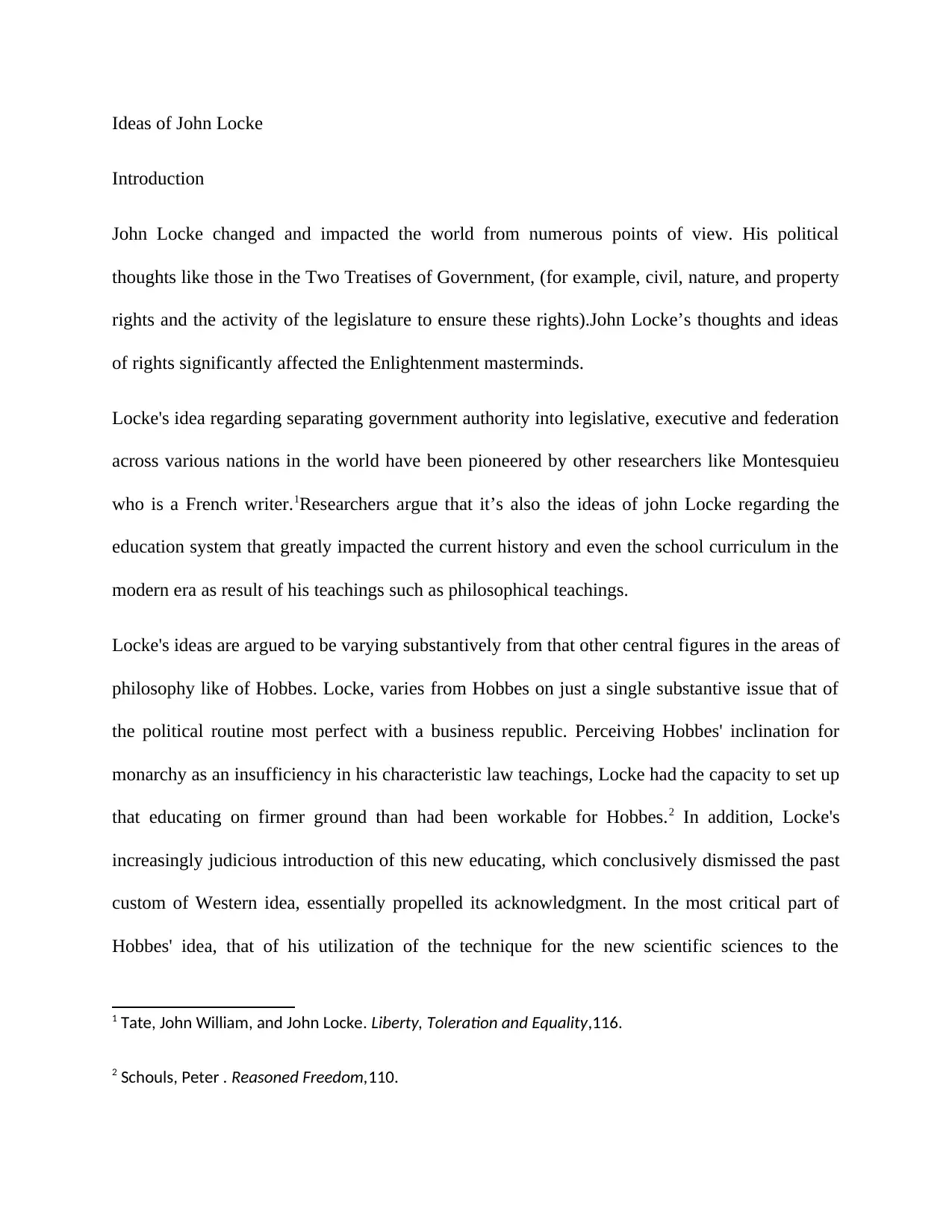
Ideas of John Locke
Introduction
John Locke changed and impacted the world from numerous points of view. His political
thoughts like those in the Two Treatises of Government, (for example, civil, nature, and property
rights and the activity of the legislature to ensure these rights).John Locke’s thoughts and ideas
of rights significantly affected the Enlightenment masterminds.
Locke's idea regarding separating government authority into legislative, executive and federation
across various nations in the world have been pioneered by other researchers like Montesquieu
who is a French writer.1Researchers argue that it’s also the ideas of john Locke regarding the
education system that greatly impacted the current history and even the school curriculum in the
modern era as result of his teachings such as philosophical teachings.
Locke's ideas are argued to be varying substantively from that other central figures in the areas of
philosophy like of Hobbes. Locke, varies from Hobbes on just a single substantive issue that of
the political routine most perfect with a business republic. Perceiving Hobbes' inclination for
monarchy as an insufficiency in his characteristic law teachings, Locke had the capacity to set up
that educating on firmer ground than had been workable for Hobbes.2 In addition, Locke's
increasingly judicious introduction of this new educating, which conclusively dismissed the past
custom of Western idea, essentially propelled its acknowledgment. In the most critical part of
Hobbes' idea, that of his utilization of the technique for the new scientific sciences to the
1 Tate, John William, and John Locke. Liberty, Toleration and Equality,116.
2 Schouls, Peter . Reasoned Freedom,110.
Introduction
John Locke changed and impacted the world from numerous points of view. His political
thoughts like those in the Two Treatises of Government, (for example, civil, nature, and property
rights and the activity of the legislature to ensure these rights).John Locke’s thoughts and ideas
of rights significantly affected the Enlightenment masterminds.
Locke's idea regarding separating government authority into legislative, executive and federation
across various nations in the world have been pioneered by other researchers like Montesquieu
who is a French writer.1Researchers argue that it’s also the ideas of john Locke regarding the
education system that greatly impacted the current history and even the school curriculum in the
modern era as result of his teachings such as philosophical teachings.
Locke's ideas are argued to be varying substantively from that other central figures in the areas of
philosophy like of Hobbes. Locke, varies from Hobbes on just a single substantive issue that of
the political routine most perfect with a business republic. Perceiving Hobbes' inclination for
monarchy as an insufficiency in his characteristic law teachings, Locke had the capacity to set up
that educating on firmer ground than had been workable for Hobbes.2 In addition, Locke's
increasingly judicious introduction of this new educating, which conclusively dismissed the past
custom of Western idea, essentially propelled its acknowledgment. In the most critical part of
Hobbes' idea, that of his utilization of the technique for the new scientific sciences to the
1 Tate, John William, and John Locke. Liberty, Toleration and Equality,116.
2 Schouls, Peter . Reasoned Freedom,110.
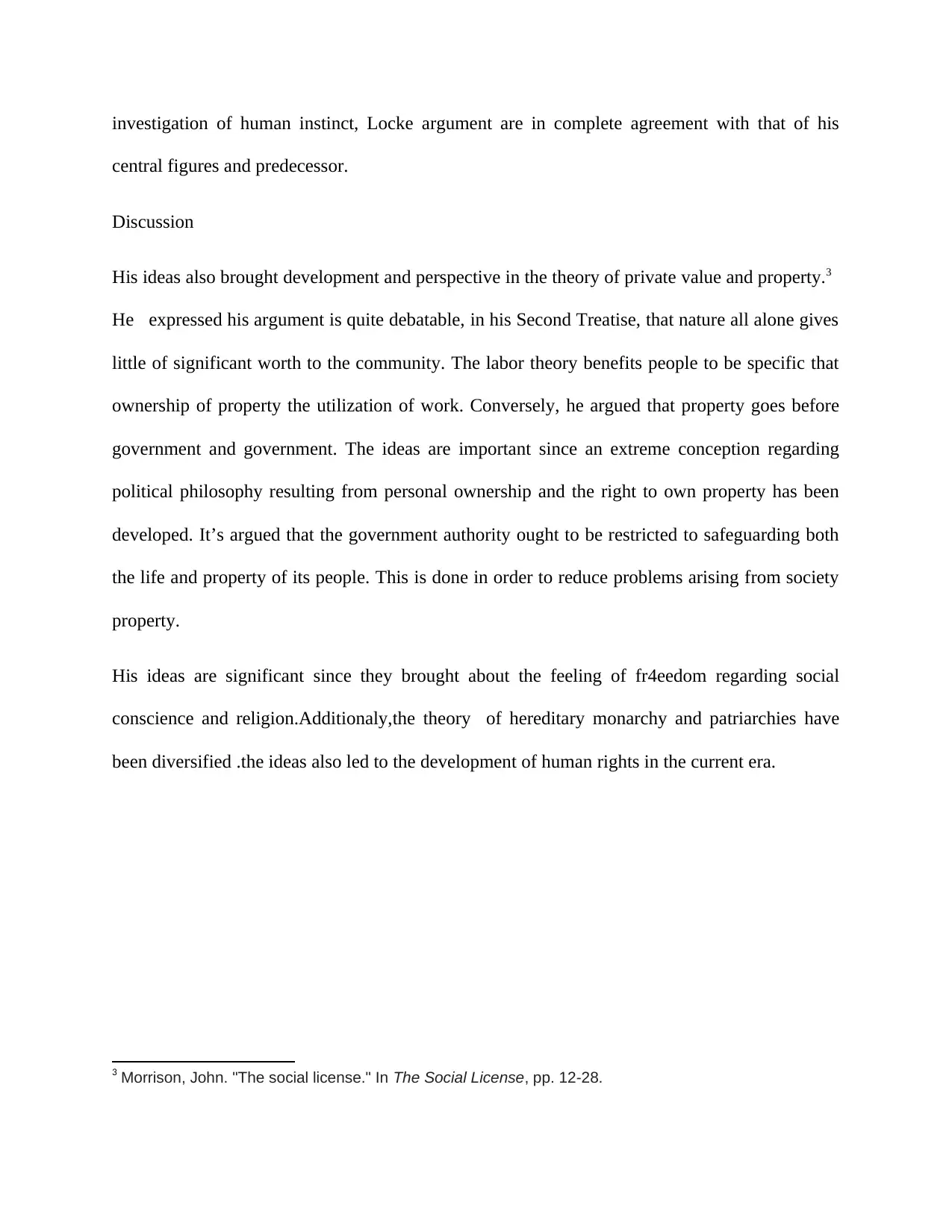
investigation of human instinct, Locke argument are in complete agreement with that of his
central figures and predecessor.
Discussion
His ideas also brought development and perspective in the theory of private value and property.3
He expressed his argument is quite debatable, in his Second Treatise, that nature all alone gives
little of significant worth to the community. The labor theory benefits people to be specific that
ownership of property the utilization of work. Conversely, he argued that property goes before
government and government. The ideas are important since an extreme conception regarding
political philosophy resulting from personal ownership and the right to own property has been
developed. It’s argued that the government authority ought to be restricted to safeguarding both
the life and property of its people. This is done in order to reduce problems arising from society
property.
His ideas are significant since they brought about the feeling of fr4eedom regarding social
conscience and religion.Additionaly,the theory of hereditary monarchy and patriarchies have
been diversified .the ideas also led to the development of human rights in the current era.
3 Morrison, John. "The social license." In The Social License, pp. 12-28.
central figures and predecessor.
Discussion
His ideas also brought development and perspective in the theory of private value and property.3
He expressed his argument is quite debatable, in his Second Treatise, that nature all alone gives
little of significant worth to the community. The labor theory benefits people to be specific that
ownership of property the utilization of work. Conversely, he argued that property goes before
government and government. The ideas are important since an extreme conception regarding
political philosophy resulting from personal ownership and the right to own property has been
developed. It’s argued that the government authority ought to be restricted to safeguarding both
the life and property of its people. This is done in order to reduce problems arising from society
property.
His ideas are significant since they brought about the feeling of fr4eedom regarding social
conscience and religion.Additionaly,the theory of hereditary monarchy and patriarchies have
been diversified .the ideas also led to the development of human rights in the current era.
3 Morrison, John. "The social license." In The Social License, pp. 12-28.
⊘ This is a preview!⊘
Do you want full access?
Subscribe today to unlock all pages.

Trusted by 1+ million students worldwide
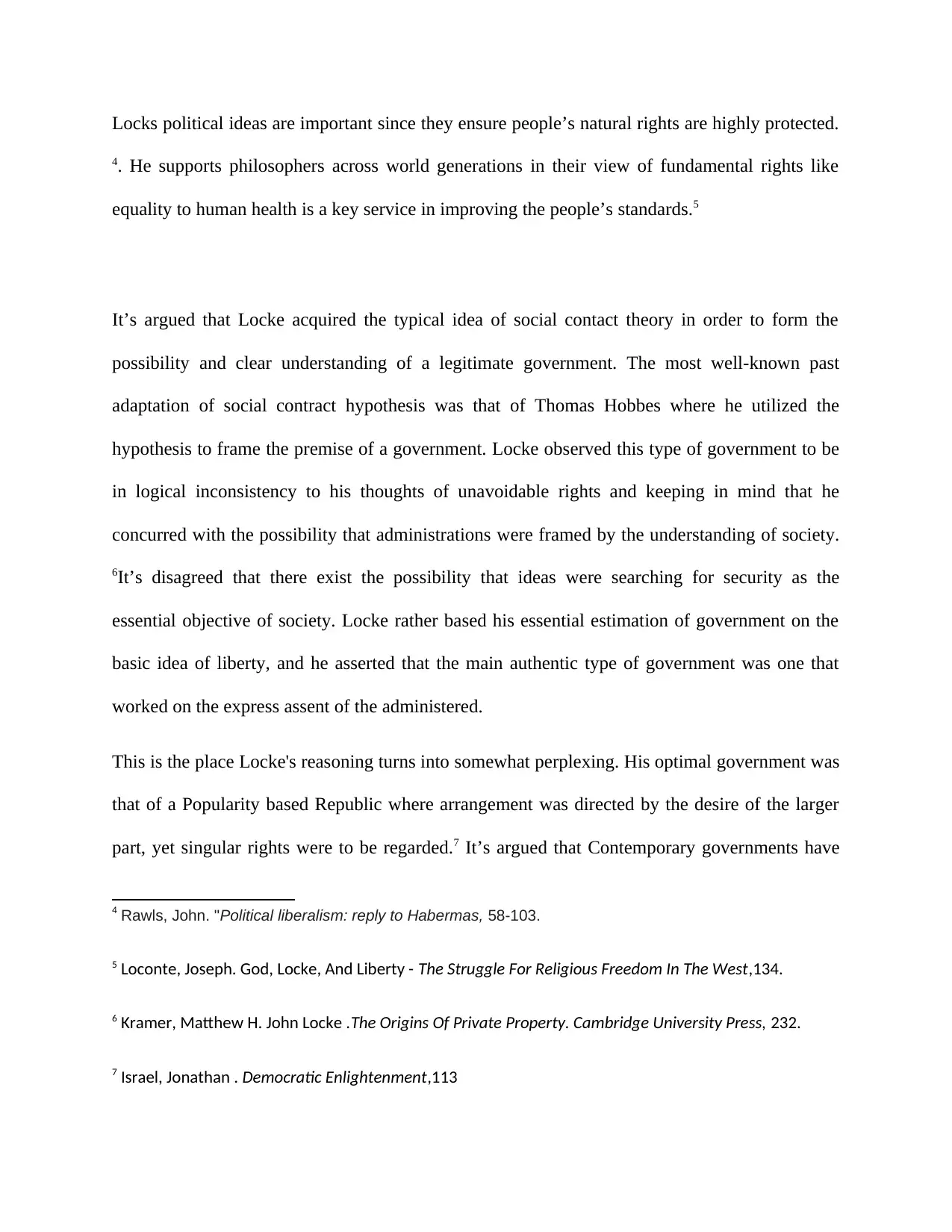
Locks political ideas are important since they ensure people’s natural rights are highly protected.
4. He supports philosophers across world generations in their view of fundamental rights like
equality to human health is a key service in improving the people’s standards.5
It’s argued that Locke acquired the typical idea of social contact theory in order to form the
possibility and clear understanding of a legitimate government. The most well-known past
adaptation of social contract hypothesis was that of Thomas Hobbes where he utilized the
hypothesis to frame the premise of a government. Locke observed this type of government to be
in logical inconsistency to his thoughts of unavoidable rights and keeping in mind that he
concurred with the possibility that administrations were framed by the understanding of society.
6It’s disagreed that there exist the possibility that ideas were searching for security as the
essential objective of society. Locke rather based his essential estimation of government on the
basic idea of liberty, and he asserted that the main authentic type of government was one that
worked on the express assent of the administered.
This is the place Locke's reasoning turns into somewhat perplexing. His optimal government was
that of a Popularity based Republic where arrangement was directed by the desire of the larger
part, yet singular rights were to be regarded.7 It’s argued that Contemporary governments have
4 Rawls, John. "Political liberalism: reply to Habermas, 58-103.
5 Loconte, Joseph. God, Locke, And Liberty - The Struggle For Religious Freedom In The West,134.
6 Kramer, Matthew H. John Locke .The Origins Of Private Property. Cambridge University Press, 232.
7 Israel, Jonathan . Democratic Enlightenment,113
4. He supports philosophers across world generations in their view of fundamental rights like
equality to human health is a key service in improving the people’s standards.5
It’s argued that Locke acquired the typical idea of social contact theory in order to form the
possibility and clear understanding of a legitimate government. The most well-known past
adaptation of social contract hypothesis was that of Thomas Hobbes where he utilized the
hypothesis to frame the premise of a government. Locke observed this type of government to be
in logical inconsistency to his thoughts of unavoidable rights and keeping in mind that he
concurred with the possibility that administrations were framed by the understanding of society.
6It’s disagreed that there exist the possibility that ideas were searching for security as the
essential objective of society. Locke rather based his essential estimation of government on the
basic idea of liberty, and he asserted that the main authentic type of government was one that
worked on the express assent of the administered.
This is the place Locke's reasoning turns into somewhat perplexing. His optimal government was
that of a Popularity based Republic where arrangement was directed by the desire of the larger
part, yet singular rights were to be regarded.7 It’s argued that Contemporary governments have
4 Rawls, John. "Political liberalism: reply to Habermas, 58-103.
5 Loconte, Joseph. God, Locke, And Liberty - The Struggle For Religious Freedom In The West,134.
6 Kramer, Matthew H. John Locke .The Origins Of Private Property. Cambridge University Press, 232.
7 Israel, Jonathan . Democratic Enlightenment,113
Paraphrase This Document
Need a fresh take? Get an instant paraphrase of this document with our AI Paraphraser
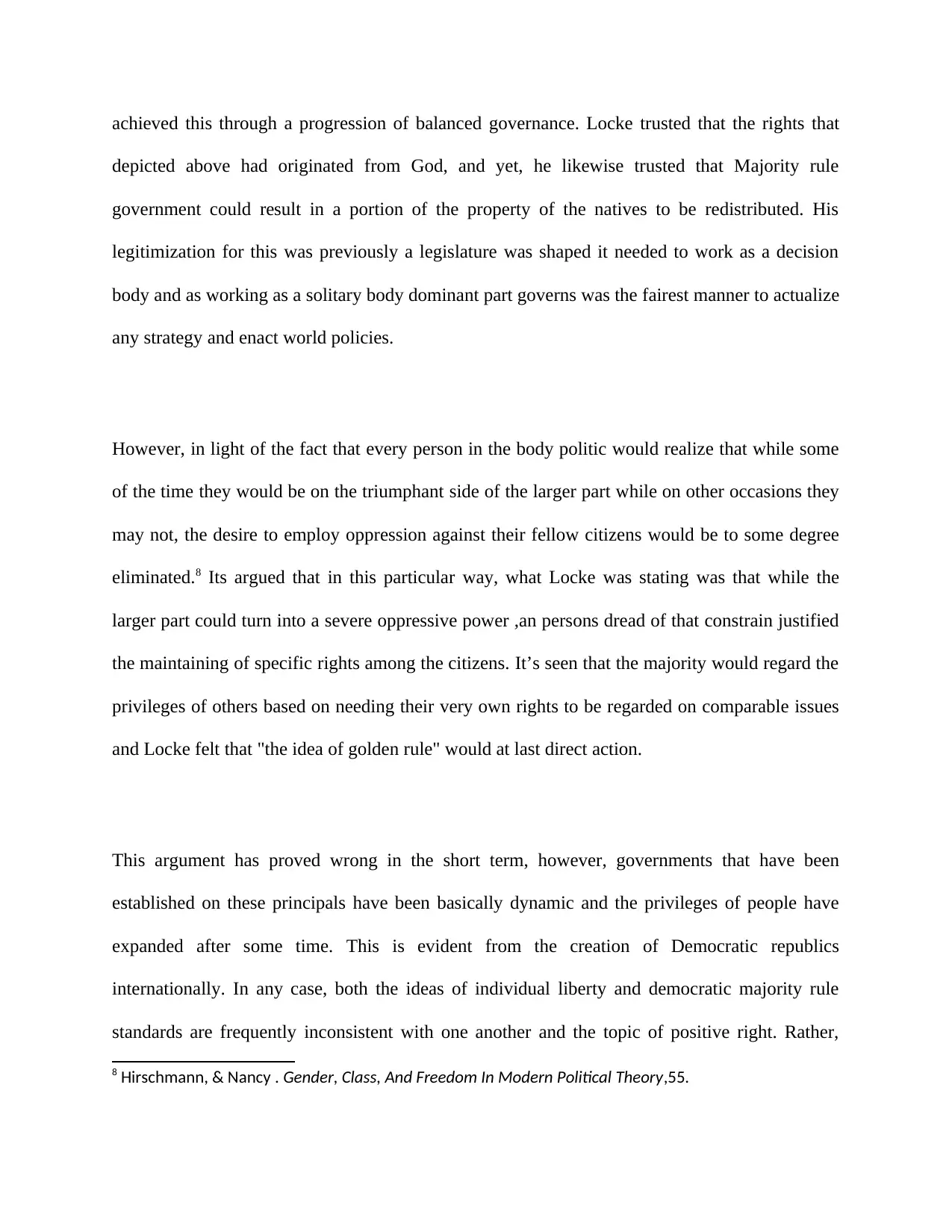
achieved this through a progression of balanced governance. Locke trusted that the rights that
depicted above had originated from God, and yet, he likewise trusted that Majority rule
government could result in a portion of the property of the natives to be redistributed. His
legitimization for this was previously a legislature was shaped it needed to work as a decision
body and as working as a solitary body dominant part governs was the fairest manner to actualize
any strategy and enact world policies.
However, in light of the fact that every person in the body politic would realize that while some
of the time they would be on the triumphant side of the larger part while on other occasions they
may not, the desire to employ oppression against their fellow citizens would be to some degree
eliminated.8 Its argued that in this particular way, what Locke was stating was that while the
larger part could turn into a severe oppressive power ,an persons dread of that constrain justified
the maintaining of specific rights among the citizens. It’s seen that the majority would regard the
privileges of others based on needing their very own rights to be regarded on comparable issues
and Locke felt that "the idea of golden rule" would at last direct action.
This argument has proved wrong in the short term, however, governments that have been
established on these principals have been basically dynamic and the privileges of people have
expanded after some time. This is evident from the creation of Democratic republics
internationally. In any case, both the ideas of individual liberty and democratic majority rule
standards are frequently inconsistent with one another and the topic of positive right. Rather,
8 Hirschmann, & Nancy . Gender, Class, And Freedom In Modern Political Theory,55.
depicted above had originated from God, and yet, he likewise trusted that Majority rule
government could result in a portion of the property of the natives to be redistributed. His
legitimization for this was previously a legislature was shaped it needed to work as a decision
body and as working as a solitary body dominant part governs was the fairest manner to actualize
any strategy and enact world policies.
However, in light of the fact that every person in the body politic would realize that while some
of the time they would be on the triumphant side of the larger part while on other occasions they
may not, the desire to employ oppression against their fellow citizens would be to some degree
eliminated.8 Its argued that in this particular way, what Locke was stating was that while the
larger part could turn into a severe oppressive power ,an persons dread of that constrain justified
the maintaining of specific rights among the citizens. It’s seen that the majority would regard the
privileges of others based on needing their very own rights to be regarded on comparable issues
and Locke felt that "the idea of golden rule" would at last direct action.
This argument has proved wrong in the short term, however, governments that have been
established on these principals have been basically dynamic and the privileges of people have
expanded after some time. This is evident from the creation of Democratic republics
internationally. In any case, both the ideas of individual liberty and democratic majority rule
standards are frequently inconsistent with one another and the topic of positive right. Rather,
8 Hirschmann, & Nancy . Gender, Class, And Freedom In Modern Political Theory,55.
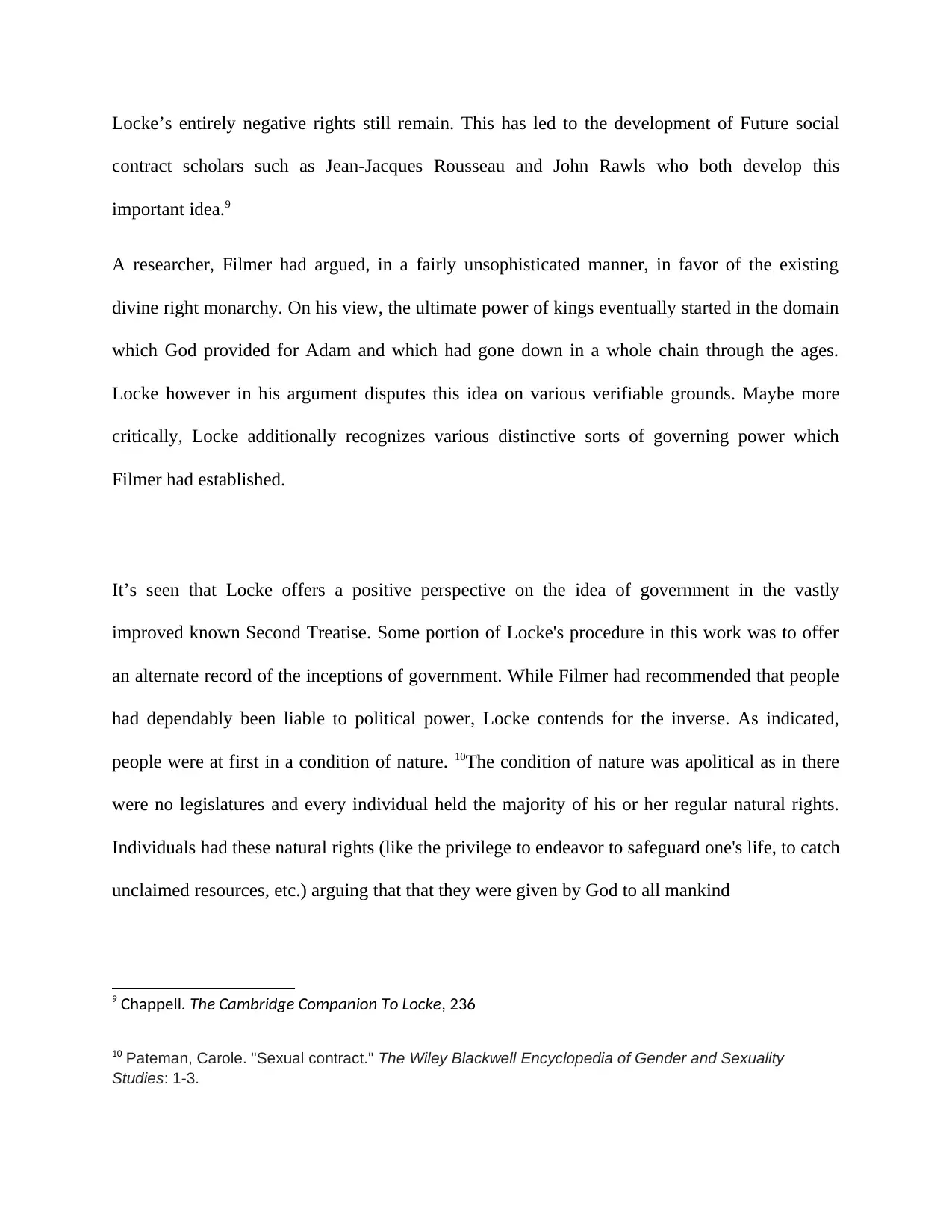
Locke’s entirely negative rights still remain. This has led to the development of Future social
contract scholars such as Jean-Jacques Rousseau and John Rawls who both develop this
important idea.9
A researcher, Filmer had argued, in a fairly unsophisticated manner, in favor of the existing
divine right monarchy. On his view, the ultimate power of kings eventually started in the domain
which God provided for Adam and which had gone down in a whole chain through the ages.
Locke however in his argument disputes this idea on various verifiable grounds. Maybe more
critically, Locke additionally recognizes various distinctive sorts of governing power which
Filmer had established.
It’s seen that Locke offers a positive perspective on the idea of government in the vastly
improved known Second Treatise. Some portion of Locke's procedure in this work was to offer
an alternate record of the inceptions of government. While Filmer had recommended that people
had dependably been liable to political power, Locke contends for the inverse. As indicated,
people were at first in a condition of nature. 10The condition of nature was apolitical as in there
were no legislatures and every individual held the majority of his or her regular natural rights.
Individuals had these natural rights (like the privilege to endeavor to safeguard one's life, to catch
unclaimed resources, etc.) arguing that that they were given by God to all mankind
9 Chappell. The Cambridge Companion To Locke, 236
10 Pateman, Carole. "Sexual contract." The Wiley Blackwell Encyclopedia of Gender and Sexuality
Studies: 1-3.
contract scholars such as Jean-Jacques Rousseau and John Rawls who both develop this
important idea.9
A researcher, Filmer had argued, in a fairly unsophisticated manner, in favor of the existing
divine right monarchy. On his view, the ultimate power of kings eventually started in the domain
which God provided for Adam and which had gone down in a whole chain through the ages.
Locke however in his argument disputes this idea on various verifiable grounds. Maybe more
critically, Locke additionally recognizes various distinctive sorts of governing power which
Filmer had established.
It’s seen that Locke offers a positive perspective on the idea of government in the vastly
improved known Second Treatise. Some portion of Locke's procedure in this work was to offer
an alternate record of the inceptions of government. While Filmer had recommended that people
had dependably been liable to political power, Locke contends for the inverse. As indicated,
people were at first in a condition of nature. 10The condition of nature was apolitical as in there
were no legislatures and every individual held the majority of his or her regular natural rights.
Individuals had these natural rights (like the privilege to endeavor to safeguard one's life, to catch
unclaimed resources, etc.) arguing that that they were given by God to all mankind
9 Chappell. The Cambridge Companion To Locke, 236
10 Pateman, Carole. "Sexual contract." The Wiley Blackwell Encyclopedia of Gender and Sexuality
Studies: 1-3.
⊘ This is a preview!⊘
Do you want full access?
Subscribe today to unlock all pages.

Trusted by 1+ million students worldwide
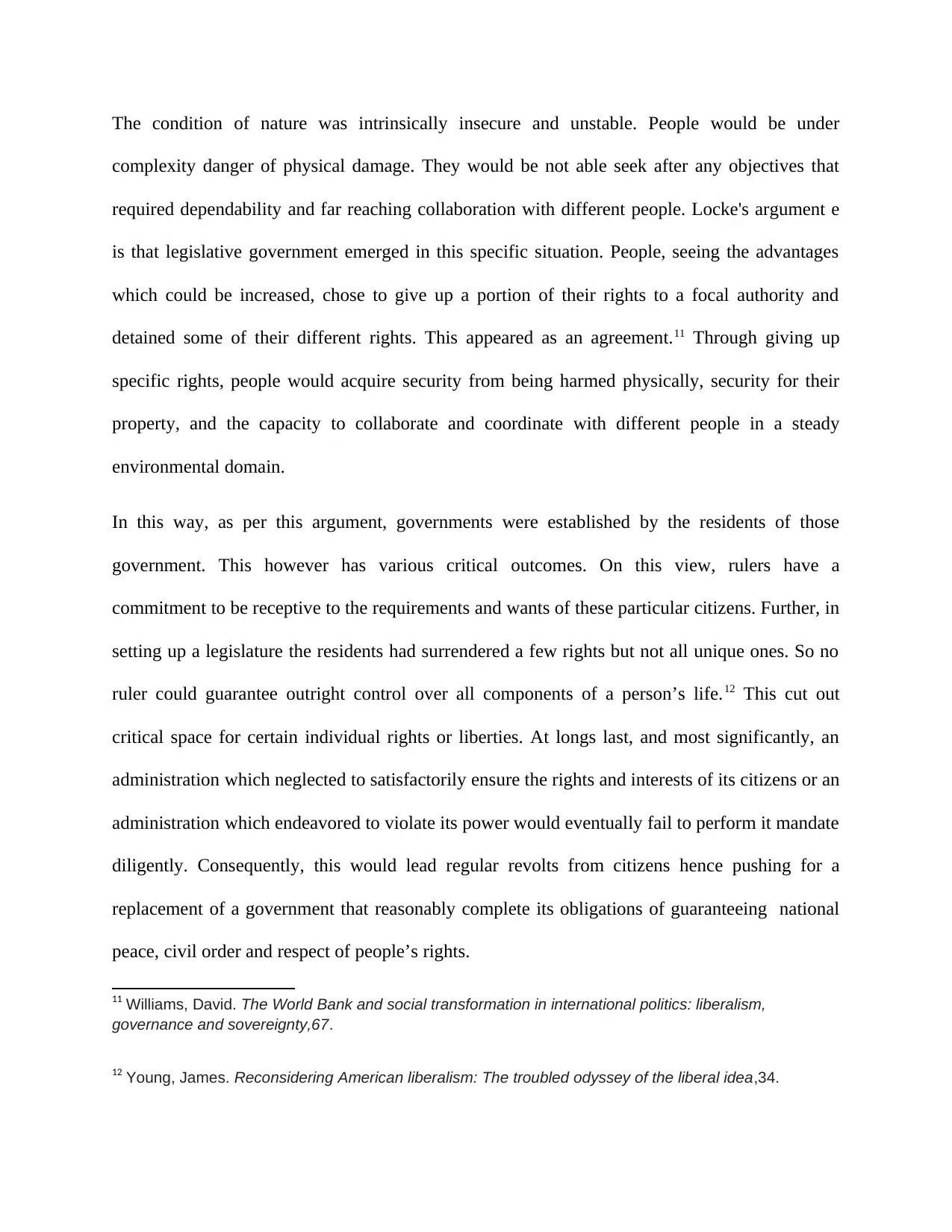
The condition of nature was intrinsically insecure and unstable. People would be under
complexity danger of physical damage. They would be not able seek after any objectives that
required dependability and far reaching collaboration with different people. Locke's argument e
is that legislative government emerged in this specific situation. People, seeing the advantages
which could be increased, chose to give up a portion of their rights to a focal authority and
detained some of their different rights. This appeared as an agreement.11 Through giving up
specific rights, people would acquire security from being harmed physically, security for their
property, and the capacity to collaborate and coordinate with different people in a steady
environmental domain.
In this way, as per this argument, governments were established by the residents of those
government. This however has various critical outcomes. On this view, rulers have a
commitment to be receptive to the requirements and wants of these particular citizens. Further, in
setting up a legislature the residents had surrendered a few rights but not all unique ones. So no
ruler could guarantee outright control over all components of a person’s life.12 This cut out
critical space for certain individual rights or liberties. At longs last, and most significantly, an
administration which neglected to satisfactorily ensure the rights and interests of its citizens or an
administration which endeavored to violate its power would eventually fail to perform it mandate
diligently. Consequently, this would lead regular revolts from citizens hence pushing for a
replacement of a government that reasonably complete its obligations of guaranteeing national
peace, civil order and respect of people’s rights.
11 Williams, David. The World Bank and social transformation in international politics: liberalism,
governance and sovereignty,67.
12 Young, James. Reconsidering American liberalism: The troubled odyssey of the liberal idea,34.
complexity danger of physical damage. They would be not able seek after any objectives that
required dependability and far reaching collaboration with different people. Locke's argument e
is that legislative government emerged in this specific situation. People, seeing the advantages
which could be increased, chose to give up a portion of their rights to a focal authority and
detained some of their different rights. This appeared as an agreement.11 Through giving up
specific rights, people would acquire security from being harmed physically, security for their
property, and the capacity to collaborate and coordinate with different people in a steady
environmental domain.
In this way, as per this argument, governments were established by the residents of those
government. This however has various critical outcomes. On this view, rulers have a
commitment to be receptive to the requirements and wants of these particular citizens. Further, in
setting up a legislature the residents had surrendered a few rights but not all unique ones. So no
ruler could guarantee outright control over all components of a person’s life.12 This cut out
critical space for certain individual rights or liberties. At longs last, and most significantly, an
administration which neglected to satisfactorily ensure the rights and interests of its citizens or an
administration which endeavored to violate its power would eventually fail to perform it mandate
diligently. Consequently, this would lead regular revolts from citizens hence pushing for a
replacement of a government that reasonably complete its obligations of guaranteeing national
peace, civil order and respect of people’s rights.
11 Williams, David. The World Bank and social transformation in international politics: liberalism,
governance and sovereignty,67.
12 Young, James. Reconsidering American liberalism: The troubled odyssey of the liberal idea,34.
Paraphrase This Document
Need a fresh take? Get an instant paraphrase of this document with our AI Paraphraser
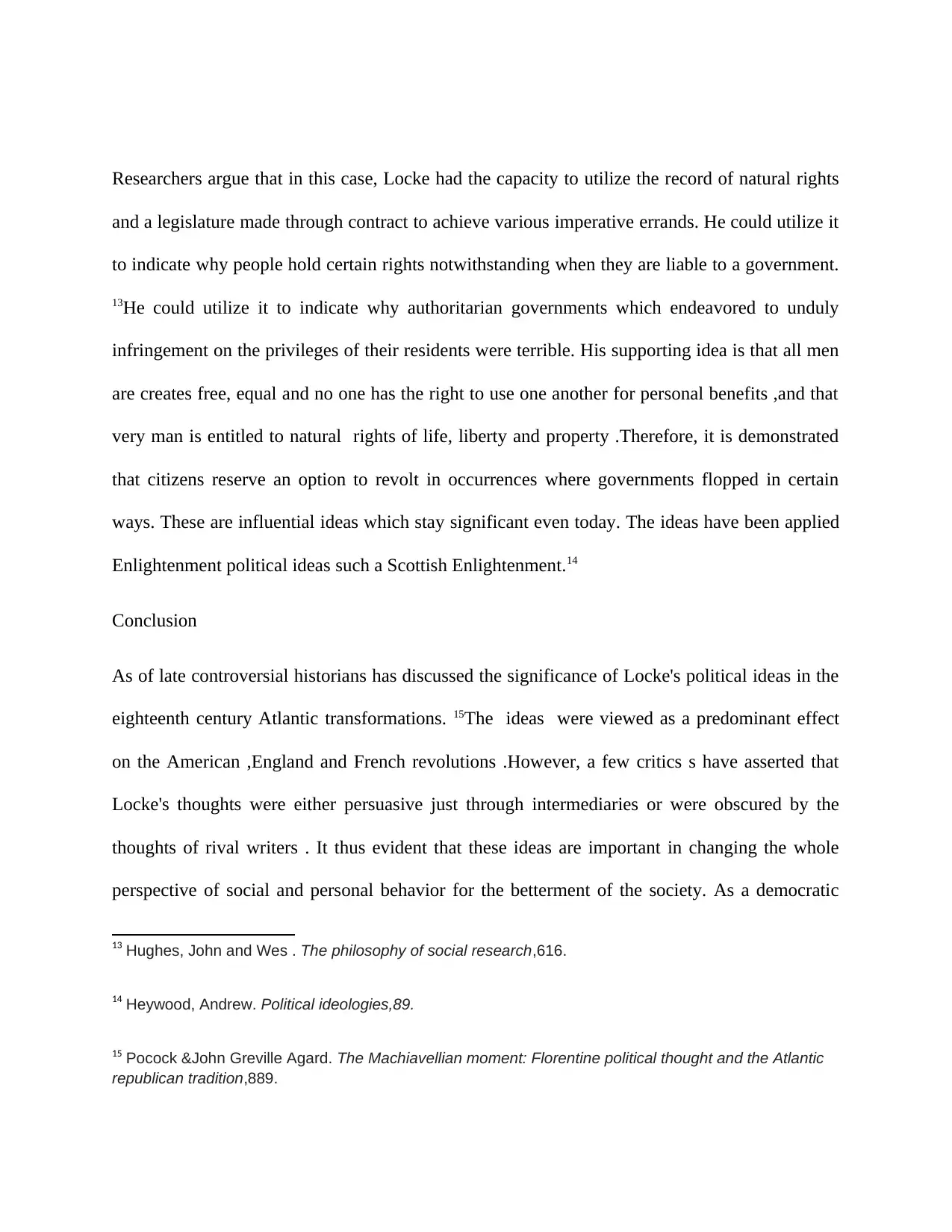
Researchers argue that in this case, Locke had the capacity to utilize the record of natural rights
and a legislature made through contract to achieve various imperative errands. He could utilize it
to indicate why people hold certain rights notwithstanding when they are liable to a government.
13He could utilize it to indicate why authoritarian governments which endeavored to unduly
infringement on the privileges of their residents were terrible. His supporting idea is that all men
are creates free, equal and no one has the right to use one another for personal benefits ,and that
very man is entitled to natural rights of life, liberty and property .Therefore, it is demonstrated
that citizens reserve an option to revolt in occurrences where governments flopped in certain
ways. These are influential ideas which stay significant even today. The ideas have been applied
Enlightenment political ideas such a Scottish Enlightenment.14
Conclusion
As of late controversial historians has discussed the significance of Locke's political ideas in the
eighteenth century Atlantic transformations. 15The ideas were viewed as a predominant effect
on the American ,England and French revolutions .However, a few critics s have asserted that
Locke's thoughts were either persuasive just through intermediaries or were obscured by the
thoughts of rival writers . It thus evident that these ideas are important in changing the whole
perspective of social and personal behavior for the betterment of the society. As a democratic
13 Hughes, John and Wes . The philosophy of social research,616.
14 Heywood, Andrew. Political ideologies,89.
15 Pocock &John Greville Agard. The Machiavellian moment: Florentine political thought and the Atlantic
republican tradition,889.
and a legislature made through contract to achieve various imperative errands. He could utilize it
to indicate why people hold certain rights notwithstanding when they are liable to a government.
13He could utilize it to indicate why authoritarian governments which endeavored to unduly
infringement on the privileges of their residents were terrible. His supporting idea is that all men
are creates free, equal and no one has the right to use one another for personal benefits ,and that
very man is entitled to natural rights of life, liberty and property .Therefore, it is demonstrated
that citizens reserve an option to revolt in occurrences where governments flopped in certain
ways. These are influential ideas which stay significant even today. The ideas have been applied
Enlightenment political ideas such a Scottish Enlightenment.14
Conclusion
As of late controversial historians has discussed the significance of Locke's political ideas in the
eighteenth century Atlantic transformations. 15The ideas were viewed as a predominant effect
on the American ,England and French revolutions .However, a few critics s have asserted that
Locke's thoughts were either persuasive just through intermediaries or were obscured by the
thoughts of rival writers . It thus evident that these ideas are important in changing the whole
perspective of social and personal behavior for the betterment of the society. As a democratic
13 Hughes, John and Wes . The philosophy of social research,616.
14 Heywood, Andrew. Political ideologies,89.
15 Pocock &John Greville Agard. The Machiavellian moment: Florentine political thought and the Atlantic
republican tradition,889.
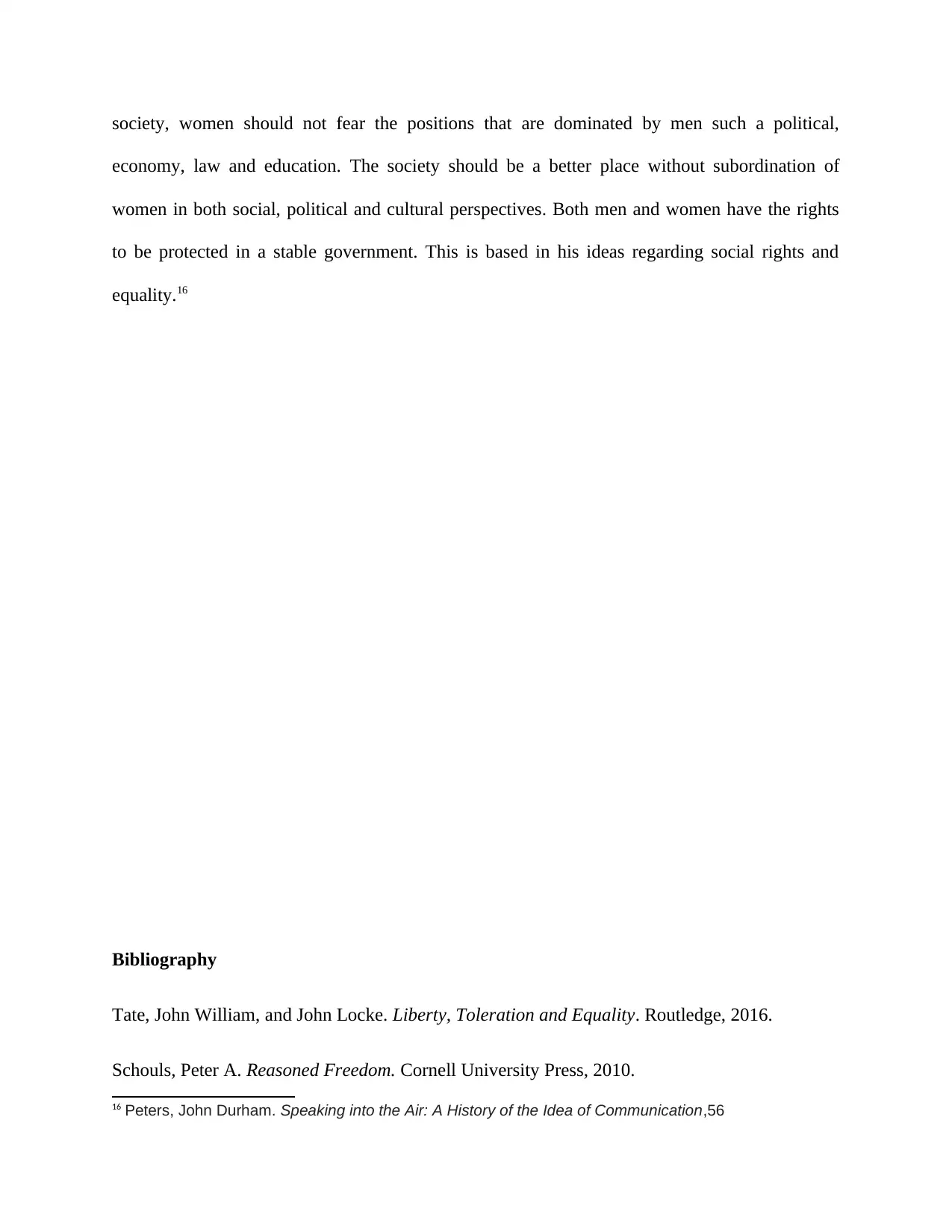
society, women should not fear the positions that are dominated by men such a political,
economy, law and education. The society should be a better place without subordination of
women in both social, political and cultural perspectives. Both men and women have the rights
to be protected in a stable government. This is based in his ideas regarding social rights and
equality.16
Bibliography
Tate, John William, and John Locke. Liberty, Toleration and Equality. Routledge, 2016.
Schouls, Peter A. Reasoned Freedom. Cornell University Press, 2010.
16 Peters, John Durham. Speaking into the Air: A History of the Idea of Communication,56
economy, law and education. The society should be a better place without subordination of
women in both social, political and cultural perspectives. Both men and women have the rights
to be protected in a stable government. This is based in his ideas regarding social rights and
equality.16
Bibliography
Tate, John William, and John Locke. Liberty, Toleration and Equality. Routledge, 2016.
Schouls, Peter A. Reasoned Freedom. Cornell University Press, 2010.
16 Peters, John Durham. Speaking into the Air: A History of the Idea of Communication,56
⊘ This is a preview!⊘
Do you want full access?
Subscribe today to unlock all pages.

Trusted by 1+ million students worldwide
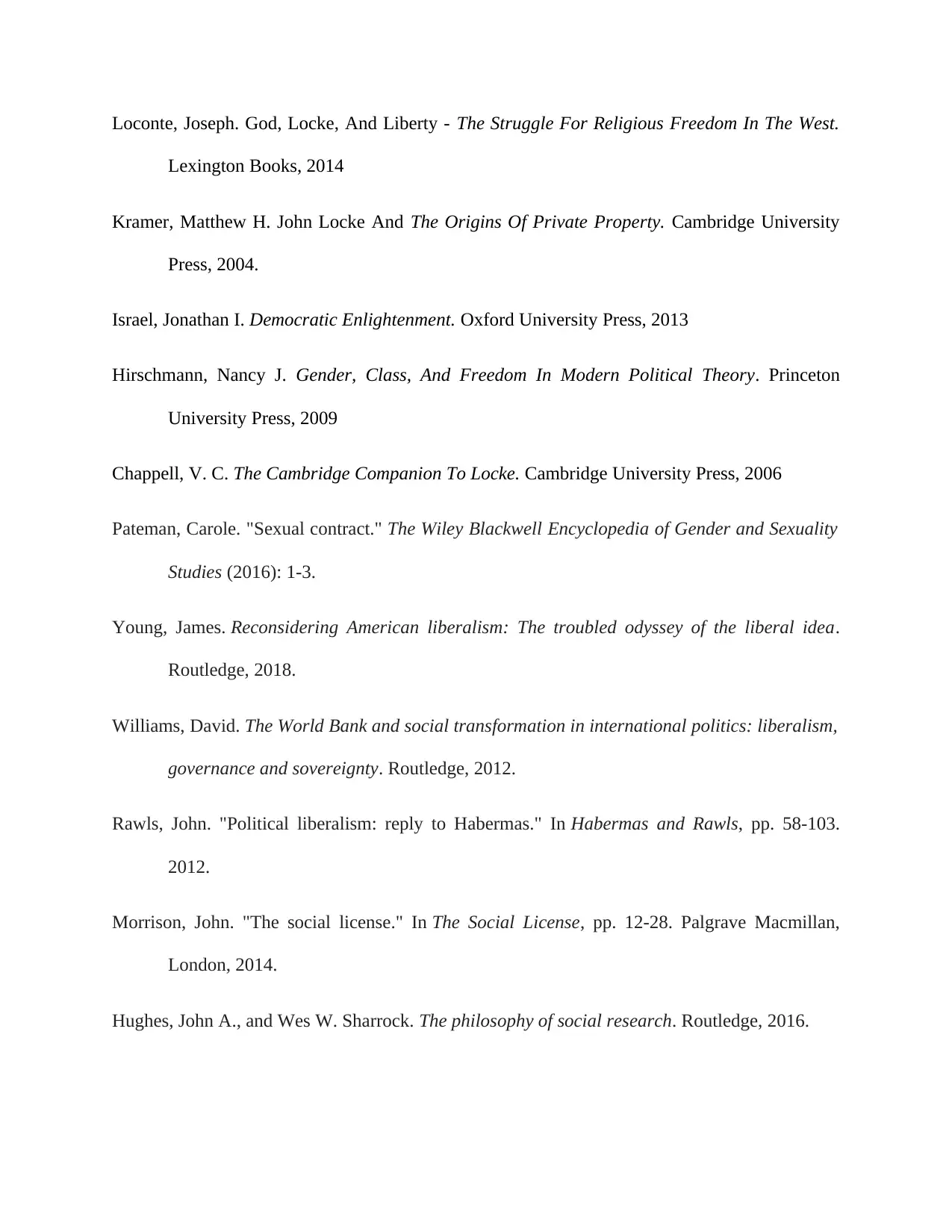
Loconte, Joseph. God, Locke, And Liberty - The Struggle For Religious Freedom In The West.
Lexington Books, 2014
Kramer, Matthew H. John Locke And The Origins Of Private Property. Cambridge University
Press, 2004.
Israel, Jonathan I. Democratic Enlightenment. Oxford University Press, 2013
Hirschmann, Nancy J. Gender, Class, And Freedom In Modern Political Theory. Princeton
University Press, 2009
Chappell, V. C. The Cambridge Companion To Locke. Cambridge University Press, 2006
Pateman, Carole. "Sexual contract." The Wiley Blackwell Encyclopedia of Gender and Sexuality
Studies (2016): 1-3.
Young, James. Reconsidering American liberalism: The troubled odyssey of the liberal idea.
Routledge, 2018.
Williams, David. The World Bank and social transformation in international politics: liberalism,
governance and sovereignty. Routledge, 2012.
Rawls, John. "Political liberalism: reply to Habermas." In Habermas and Rawls, pp. 58-103.
2012.
Morrison, John. "The social license." In The Social License, pp. 12-28. Palgrave Macmillan,
London, 2014.
Hughes, John A., and Wes W. Sharrock. The philosophy of social research. Routledge, 2016.
Lexington Books, 2014
Kramer, Matthew H. John Locke And The Origins Of Private Property. Cambridge University
Press, 2004.
Israel, Jonathan I. Democratic Enlightenment. Oxford University Press, 2013
Hirschmann, Nancy J. Gender, Class, And Freedom In Modern Political Theory. Princeton
University Press, 2009
Chappell, V. C. The Cambridge Companion To Locke. Cambridge University Press, 2006
Pateman, Carole. "Sexual contract." The Wiley Blackwell Encyclopedia of Gender and Sexuality
Studies (2016): 1-3.
Young, James. Reconsidering American liberalism: The troubled odyssey of the liberal idea.
Routledge, 2018.
Williams, David. The World Bank and social transformation in international politics: liberalism,
governance and sovereignty. Routledge, 2012.
Rawls, John. "Political liberalism: reply to Habermas." In Habermas and Rawls, pp. 58-103.
2012.
Morrison, John. "The social license." In The Social License, pp. 12-28. Palgrave Macmillan,
London, 2014.
Hughes, John A., and Wes W. Sharrock. The philosophy of social research. Routledge, 2016.
Paraphrase This Document
Need a fresh take? Get an instant paraphrase of this document with our AI Paraphraser
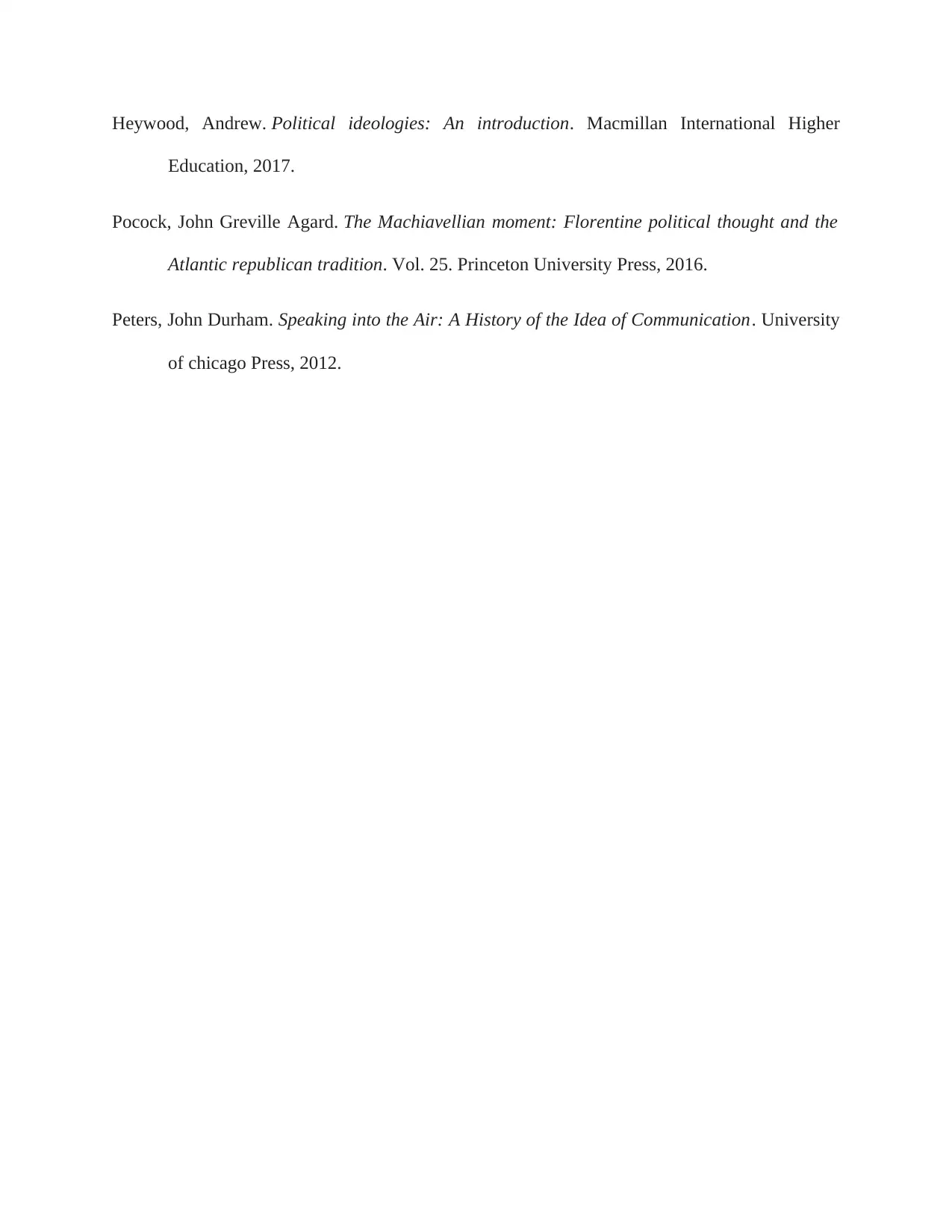
Heywood, Andrew. Political ideologies: An introduction. Macmillan International Higher
Education, 2017.
Pocock, John Greville Agard. The Machiavellian moment: Florentine political thought and the
Atlantic republican tradition. Vol. 25. Princeton University Press, 2016.
Peters, John Durham. Speaking into the Air: A History of the Idea of Communication. University
of chicago Press, 2012.
Education, 2017.
Pocock, John Greville Agard. The Machiavellian moment: Florentine political thought and the
Atlantic republican tradition. Vol. 25. Princeton University Press, 2016.
Peters, John Durham. Speaking into the Air: A History of the Idea of Communication. University
of chicago Press, 2012.
1 out of 11
Related Documents
Your All-in-One AI-Powered Toolkit for Academic Success.
+13062052269
info@desklib.com
Available 24*7 on WhatsApp / Email
![[object Object]](/_next/static/media/star-bottom.7253800d.svg)
Unlock your academic potential
Copyright © 2020–2026 A2Z Services. All Rights Reserved. Developed and managed by ZUCOL.





